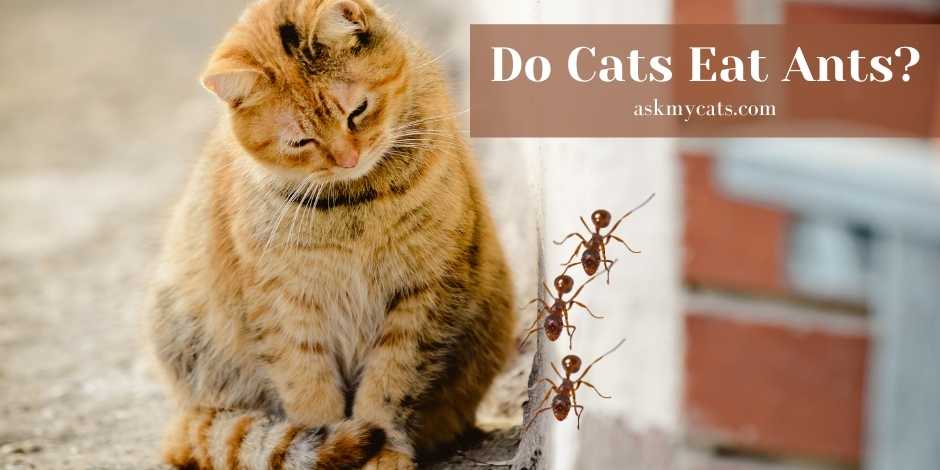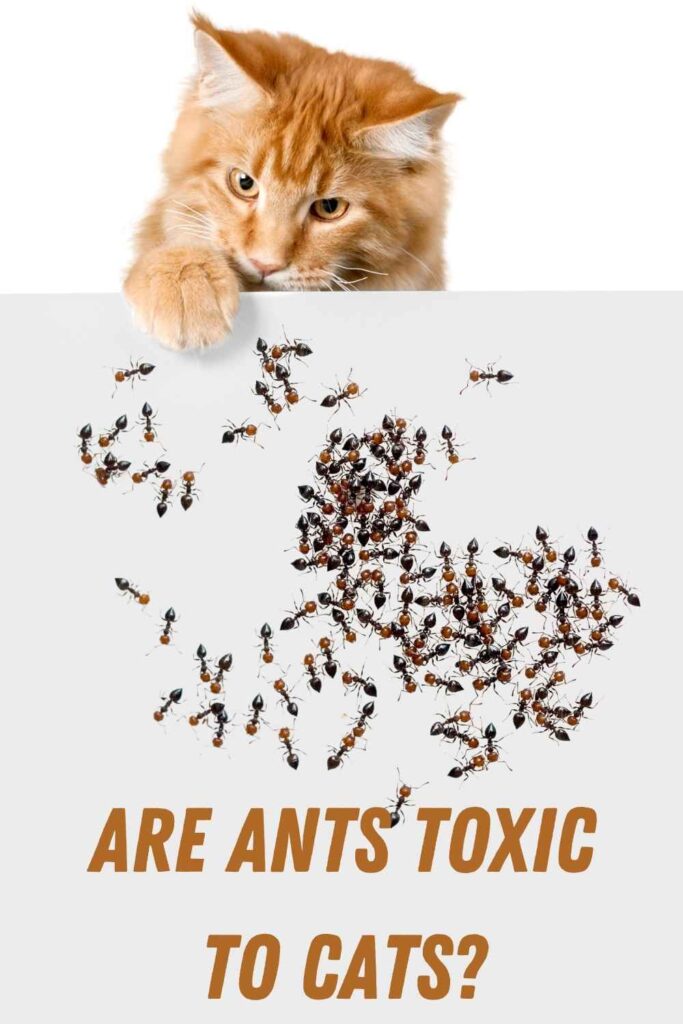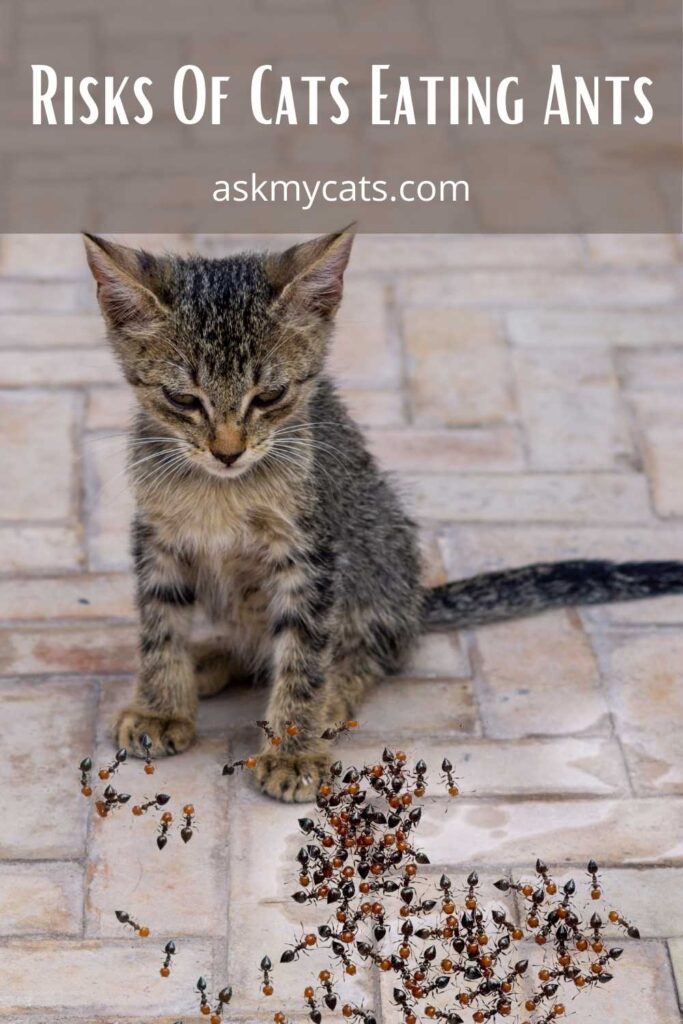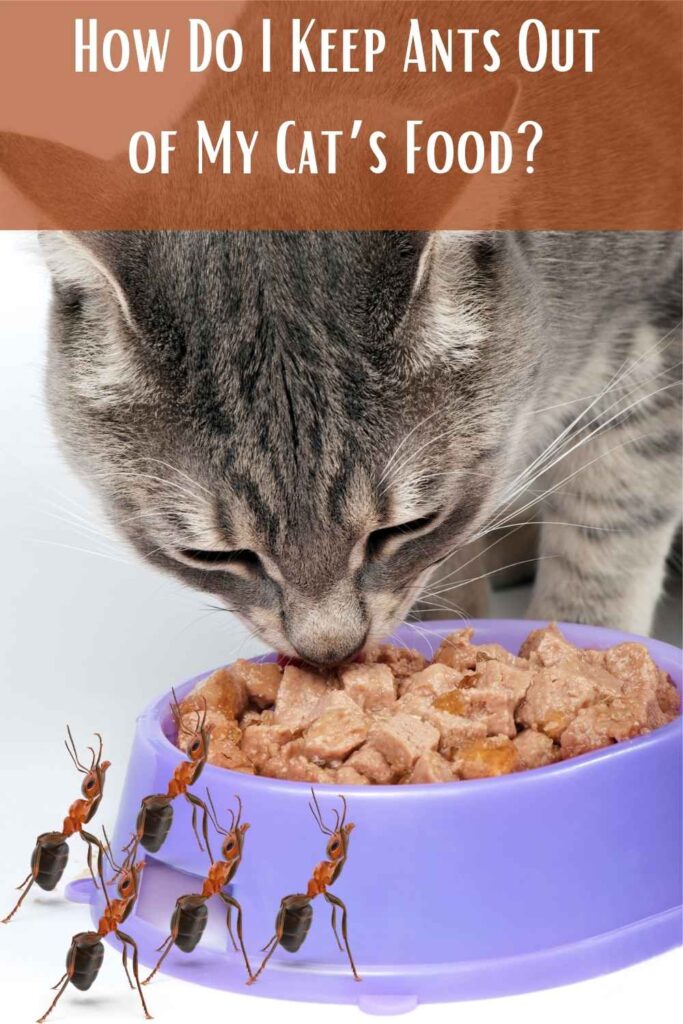If your home is like others on the planet, you’ve probably had to deal with an ant problem or two at some point. If not dealt with as soon as they are discovered, these insects can become very bothersome. Do cats eat ants, then?
Cats are capable of consuming ants, but they will prefer eating fire ants. Because of the chemicals they bring, eating ants will weaken a cat’s coat over time and cause digestive problems.
If you have cats in the house, it’s particularly important to get rid of these pests. Ants are addicted to cat food, which is why this is the case.
It doesn’t seem to matter whether your cat prefers wet or dry food, in my opinion. Ants tend to be drawn to it regardless.
Is it okay if your cat eats these bothersome insects? Is it possible for your pet to get sick from eating ants? What’s more, how can you get rid of these pests without endangering your cat?
In today’s blog, I’ll answer these questions for you so you know what to do if your cat is eating ants.


Give Your Cat the Perfect Day
Get the Free Ebook!
Is It Normal For Cats To Eat Ants?
Yes, cats are known to consume ants and it is a normal phenomenon.
Ants are everywhere, and their fast moves would definitely pique your cat’s attention. A cat that is starving and unsupervised is more likely to eat ants on a daily basis.
Cats are known to consume ants, despite the fact that most humans consider them to be a delicacy. It might also appear that your cat is playing an ant-eating game. Ants aren’t as exciting to catch as birds, but they’ll do in an emergency.
Ants are mostly harmless to cats, so it’s a good idea to instil in your feline companions. However, if they consume too much, they can have digestive problems.
Most cats only consume a single ant every now and then, only in small numbers, so there’s no need to be concerned.
You might even be relieved that your cat eats ants, especially if your house is infested with them! Your cat is like a pest control expert.
Ants may not be your favourite food, but for cats, they are not only a tasty treat but also a lot of fun to enjoy. It’s perfectly natural for cats to eat ants, so you don’t have to be concerned that your cat has developed a weird new habit.
What Happens If My Cat Eats Ants?
Your cat may not be harmed if he consumes insects, but if he eats too many ants, he will have digestive problems or discomfort.
When a human kid eats bugs, it’s usually a big deal, but if the pet is the one eating the ants, there’s nothing to think about.
Ants can not cause any side effects in your cat, not even a stomach ache until he’s finished munching.
Are Ants Toxic To Cats?

Cats are not poisoned by ants.
Outside, your cat may enjoy playing with ants, but you don’t have to be concerned about your cat eating ants. There is nothing dangerous or poisonous in ants for your pet.
It’s better that you don’t let your cat eat the little red fire ants that you sometimes see outside. Those will cause your cat’s mouth to smoke.
Large black ants may be a bigger problem, but not because they’re poisonous. Cats may be bitten by black ants. You may have been bitten by one when you were a child!
If your cat eats a black ant, they won’t be killed, but they might get a pinched tongue if they don’t eat it quickly enough.
The cat would not be harmed by eating live ants.
When your cat consumes insects that have been killed with insecticides, the same pesticides that killed the ants will enter your cat’s bloodstream.
If you’ve used insecticides, do your best to remove as many killed ants as possible to prevent this and spare yourself a ride to the vet.
Why Does My Cat Like To Eat Ants?
Ants are appealing to cats because they pique their curiosity. As weird as it might seem, your cat enjoys eating ants because they make him happy.
In a moment, we’ll get into the details of why ants make your cat happy, but you’d actually eat ants if you thought they’d make you happy.
Some people still believe it gives your cat a “high,” but let’s dig a bit further into where that theory came from in the first place.
Alpha-linolenic acid is a form of essential fatty acid found mostly in plants and oils. Normally, cats get this from cat food.
Nonetheless, they do not usually absorb this kind of Omega-3 fatty acid as well as dogs or other species.
It doesn’t take a scientist to figure out that one ant isn’t worth anything in terms of providing nutritional benefit to an animal (or a person).
Ants, on the other hand, are a healthy source of protein, zinc, iron, and calcium if consumed in sufficient quantities. They’re still limited in calories, sugar, and carbohydrates (for those who care).
Though it might seem odd to those of us in the country, ants are a common source of protein in many countries around the world.
Do Ants Make Cats High?
When cats are around ants, they can behave edgy, but this isn’t because they’re actually “big” in the way you would expect.
You may have seen a cat rubbing on ants, particularly when they’re crushed. It can seem that ants have a negative impact on your pet.
When ants are crushed, a compound called oleic acid is released, which cats detect strongly.
Oleic acid is similar to the pheromone released by cats when they rub their cheeks and chins against objects. This may explain why your cat acts “big” with ants and even tries to crush even more of them.
Ants excrete oleic and folic acids when squished, walked over, or otherwise disturbed.
These act like ant pheromones and are detected by our cat’s sense of smell. This fragrance has a soothing effect on cats and causes them to spread some of their own pheromones that they emit from their faces. As a result, I’ve been rubbing my hands over some recently squished ants.
As a result, “big” isn’t the right word to describe this influence. Instead, it’s a soothing fragrance that encourages normal feline activity.
Can Cats Get Worms From Eating Ants?
It’s possible that your cat could get worms from consuming insects, but ants aren’t the most common pest to be concerned with.
Worms are most often acquired by cats by consuming flies or getting into contact with fleas bearing the worm-causing larvae.
Ants, in comparison to flies and fleas, pose a much lower danger to your pet. As a result, you shouldn’t be concerned about your cat contracting worms from ants.
If you’re worried about your cat getting worms, make sure your cat doesn’t eat any insects, not just ants. Fleas, on the other hand, will spread the eggs to cats when brushing, so it’s not quite as simple as preventing the cat from swallowing a worm.
Risks Of Cats Eating Ants
When your cat consumes ants, there are dangers, just as there are for something that isn’t cat food.

1. Bitten By Ants
Larger carpenter ants can sting, as I said, and it’s one of the worse ant bites your cat can get if they come across a lot of them.
2. Eating Bugs Outdoor
Outside, the cat can become used to consuming bugs such as ants and begin to eat everything he sees. Since not all bugs and insects are safe to feed, you don’t want your pet to develop a bad habit.
3. Poisoned Ants
Because many people use poison to deter ants, if your cat is eating ants, especially inside, the ants may have walked through or eaten ant poison, which could be dangerous to your cat.
4. Fire Ants
Your cat won’t be able to tell the difference between “healthy” and “fire” ants. If your cat goes outside searching for tiny, fast-moving bugs, there’s a risk he’ll end up eating fire ants instead. Fire ants present more challenges because of their venom.
Since your cat enjoys eating ants, you may want to let him out. Your cat may be reminded that there are ants outside and may want to be let out more often.
What Are The Consequences Of Eating Fire Ants By Cats?
Red ants pose a great threat to a cat because their stings are poisonous enough to kill a cat.
When a cat wants to play with fire ants or red ants, they usually pay a price. When their home is attacked, red ants react quickly and in large numbers.
Their bite can cause burning, swelling, and in some cases, a dangerous allergic reaction in humans.
The red ant injects a toxic alkaloid into its prey, which causes a blistering and stinging feeling right away.
While this poisonous bite isn’t usually deadly, it can be fatal if an allergic reaction occurs. How serious will a bite on a 6-12lb cat be if those consequences occur in adults weighing 150 pounds or more?
It will be harsh, because if the cat were unable to flee a mound in time, the bites could lead to your pet’s death.
The risks aren’t so much whether or not swallowing the red ant is bad for a cat’s wellbeing, but rather the cat’s life if it gets the red ant in its mouth.
It will also bite if it is alive. Swelling in the cat’s windpipe will result from being bitten elsewhere, such as the throat on the way down. If this happens, suffocation will strike without warning.
To cut a long storey short, keep the cats away from red ants. If you have some in your yard, get rid of them as soon as you can, and dispose of the carcasses.
How Do I Keep Ants Out of My Cat’s Food?
You can keep ants away from your cat’s food by spraying pest sprays around the cat food.
When they discover there’s a bowl of cat food waiting for them, ants will certainly answer the dinner bell.

Ants in the food bowl are common indoors, but they can get out of hand if a cat is fed outside on a daily basis.
Some people have a harder time with it than others, and the magnitude of the problem varies by region.
I’ve come across a couple of horror stories on this. Each of them was a person seeking assistance when red ants would often engulf the cat’s food dish, which, as the previous segment explains, is a very dangerous situation.
Most of the time the issue isn’t as serious as it appears in this case. There are things you can do to address both indoor and outdoor pet food ant problems. Here are few suggestions:
Store cat food in a plastic bucket or bin– Ants might get into open bags of cat food and eat it, but they’d have a hard time getting over a plastic barrier.
Create an unpassable barrier– Diatomaceous earth (food grade) is a great powder that can kill ants after they attempt to cross it. There are no insecticides or other chemicals in food-grade DE that might damage your pet.
It would also be perfect if the cat eats a smidgeon of it. DE is also considered to be effective in the treatment of flea infestations.
A food bowl island– This is a fantastic outdoor option. Locate a tray that can handle a small amount of water and put the food bowl in the centre of it. Simply add water and you’re done. Ants can’t dive, so they’ll drown if they try to hit the bowl.
However, once the cat has finished eating, it is a smart idea to drain the water to avoid creating a stagnant water problem. Insects are attracted to stagnant water.
“Cleanliness is right up there with ant-free-ness” – Indoors and out, keeping attractors down, such as food crumbs or residue, can make a huge difference. Keeping feeding areas clean eliminates any incentive for ants to inspect the field.
Frequently Asked Questions
Is it okay for my cat to eat ants?
Ants are mostly harmless to cats, so it’s a good idea to instil in your feline companions. However, if they consume too much, they can have digestive problems. Most cats only consume a single ant every now and then, only in small numbers, so there’s no need to be concerned.
Do ants bother cats?
Cats are generally unaffected by ants. Cats may be bitten by large black ants, but the bites are harmless. Rats, on the other hand, are at risk from fire ants.
Do cats attract ants?
Ants are drawn to the crumbs and food left behind when your cat has fed, which attracts them into your house. Washing the dog’s dishes on a daily basis is one of the best ways to keep ants out of their food bowl. Every couple of days, carefully scrub their dishes with a pet-safe detergent.
Final Words
Ants are a human annoyance rather than a pet annoyance. And though they should, cats don’t indulge our anti-insect attitudes (red ants and bees).
They’ll keep a close eye on the ants while they scurry off, play with them, and eat them. Another toy has piqued its interest.
So, if you see your cat chasing and chewing black ants, don’t be alarmed. And if it’s a larger form of black ant that bites, they don’t release venom like red ants do.
So, to keep your cat healthy, go for a walk around the yard to see what sorts of animals live there.
If you see some red ant hills nearby, get rid of them; otherwise, it’s just cats doing cat stuff and everything will be perfect.
